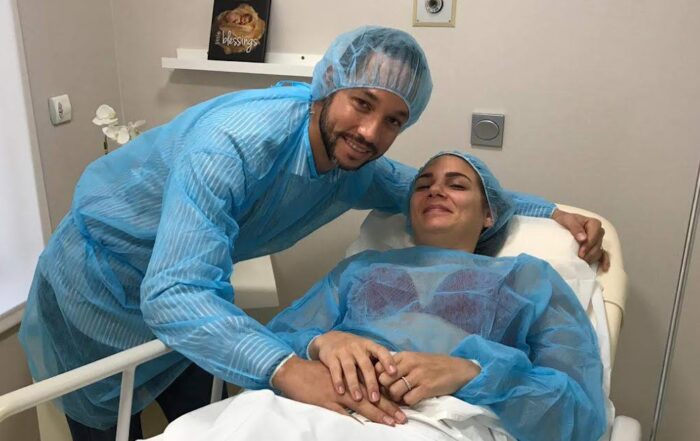Four Fertility Treatments to Try Before IVF
I’ve had many patients with the same story: after trying to conceive for a year with no success, they launched right into IVF. Although IVF can help you get pregnant, it’s physically and financially taxing and may be better suited as an option to pursue later on. The success rate for IVF is around 25-35% in the United States. Personally, I think there are ways to prepare your body to make that success rate higher, but we’ll get to that at the end of this post.
Below are four fertility treatments to try before IVF (with similar success rates):
1. Tracking Your Cycle and Hormones
If you’ve ![]() been TTC (trying to conceive) every month but haven’t checked your hormones, I highly recommend it! Try using test strips combined with an app like Inito. This at-home data collection can give you easy feedback to improve your hormone health.
been TTC (trying to conceive) every month but haven’t checked your hormones, I highly recommend it! Try using test strips combined with an app like Inito. This at-home data collection can give you easy feedback to improve your hormone health.
For example, you may be able to see that your estrogen isn’t peaking or falling at any point in your cycle, or that your progesterone is low throughout your entire cycle. Without the proper rise and fall of hormones, ovulation doesn’t occur and the uterine lining doesn’t build up for implantation.
Similarly, progesterone should rise in the second half of your cycle, and if that doesn’t happen, you may be a candidate for topical or oral progesterone after talking to your physician. Small tweaks like this are much more affordable than IVF, and uncovering these issues may bring you closer to a solution for fertility.
2. Mercier Therapy
Mercier therapy is a manual therapy that involves deep tissue mobilization (think abdominal/pelvic massage) of the uterus, ovaries, and pelvic musculature. You can find certified Mercier Therapists all over the US, and internationally. Sometimes a physical release of the uterus, and stimulation of the ovaries is enough to create a more fertile environment.
Releasing restrictions in your pelvis is particularly important if you’ve experienced repeat miscarriages, previous abdominal surgeries, endometriosis, or PCOS. Extra tissue (from scars or otherwise) can restrict blood flow to the uterus and ovaries, which also restricts their function and hormone production.
3. Ovulation Induction
Some women have every other piece in place but do not naturally ovulate on their own. If you’ve tried testing with ovulation (LH) strips, and never get a positive, ovulation induction might be a good option for you. It requires taking medication or performing injections during the first week of your cycle, followed by monitoring. The oral medication or injections can be used to grow and release a dominant follicle. Paired with timed intercourse, this may be as effective as IVF with less cost and slightly less chemical interventions.
4. IUI (Intrauterine Insemination)
IUI often gets confused with IVF. With IUI, you are still ideally tracking your cycle but using “washed” sperm placed near the entrance of the cervix. Washing sperm is a process that removes the lower quality/less mobile sperm, leaving a concentration of strong swimmers placed right next to the cervix, increasing the odds of fertilization.
This can be particularly helpful when your partner has lower than ideal sperm quality or your cervical mucus has been taking down sperm before it can find the egg. It’s less invasive than IVF, costs less, mirrors natural conception more, and does not require the transfer of an embryo.
Preparing your body for fertility treatments.
Remember how I said there are ways to make IVF (and really any of these fertility options) more effective? I fully believe that preparing your body physically, emotionally, and nutritionally can make the difference between needing one or four rounds of IVF to achieve pregnancy.
Nutritionally:
Work with a holistic practitioner or nutritionist to fill up your nutrient tanks or address underlying health issues. When I work with women trying to conceive, we often need to spend a few months clearing up chronic gut issues like yeast, SIBO, or leaky gut. Doing this increases their overall health, decreases their stress, and improves their hormone regulations.
Other common nutritional/chemical issues I see affecting fertility are thyroid issues and estrogen detoxification. Making a healthier you paves the way for fertility treatments to be more effective.
Mentally & Emotionally:
Being in a constant state of stress and exhaustion, and working long hours with no “me time,” is not ideal for conceiving a baby. Mental health should be on your radar, as fertility issues tend  to add to the stress you already have rather than alleviating it.
to add to the stress you already have rather than alleviating it.
Some options to try might be conventional talk therapy, therapy with EMDR, Neuroemotional Technique, meditation (classes and apps help), yoga, or breathwork.
Physically:
Address chronic aches, pains, and scar tissue. These can impede fertility particularly if they are located in the abdomen or pelvis. Constant chronic pain in your back, headaches, or extremities may also be signs of dysfunction that can correlate with poor fertility.
Finding exercise or movement you enjoy now is crucial, as it supports fertility, stress release, and also promotes a healthy pregnancy. Walking and dance parties are totally fair game if you have a hard time finding enjoyable exercise!
Overall, spending anywhere from 3-12 months creating a healthier YOU is likely to improve the success rates of any fertility treatment you choose!
We are incredibly grateful to all of our writers, who open up their hearts and share their journey with this community. If you would like to connect with one of our writers, please contact us.
The views and opinions expressed are those of the authors and do not necessarily reflect the official policy or position of the Hopeful Mama Foundation. Our authors provide content reflecting their views and do not intend to malign any religion, ethnic group, club, organization, company, or individual.
Recent insights, guides, & resources.
Finding Hope on the Path to Motherhood
Rafaella Elias- Guest Author2026-01-28T13:03:42-06:00January 24th, 2026|
Sip & Shop for Hope: Presented by Donor Nexus
Hopeful Mama Foundation2025-12-15T13:43:26-06:00December 15th, 2025|
Seasonal Pressure
Maddie Moree2025-11-21T16:07:01-06:00November 21st, 2025|

About the author:
Dr. Hannah Anderson
Dr. Hannah Anderson is a chiropractor at Corridor Wellness in downtown Cedar Rapids, Iowa. She specializes in women’s health, fertility, pregnancy, and pediatrics. She works with patients of all ages in regards to nutritional, emotional, and physical health by addressing the whole person rather than pieces. Dr. Hannah is certified by the ICPA in pediatric and maternal health care, trained in Neuroemotional Technique, Quantum Neurology, and Mercier Therapy. She is passionate about helping women during all phases of the motherhood transition, preconception through postpartum. You can find her at corridorwellclinic.com or on Instagram @drhannahanderson.




